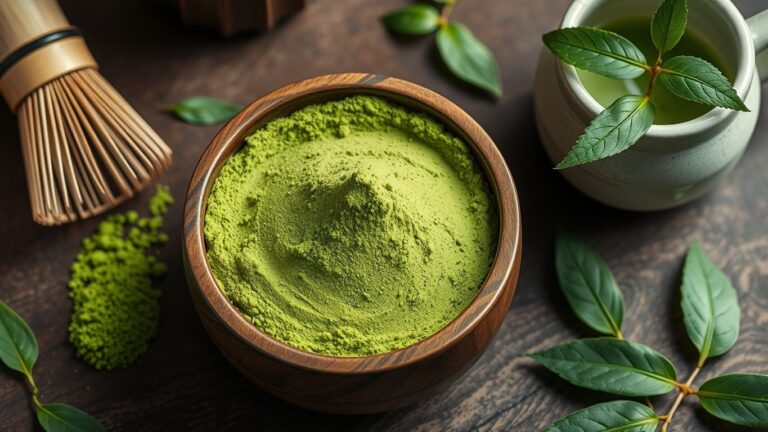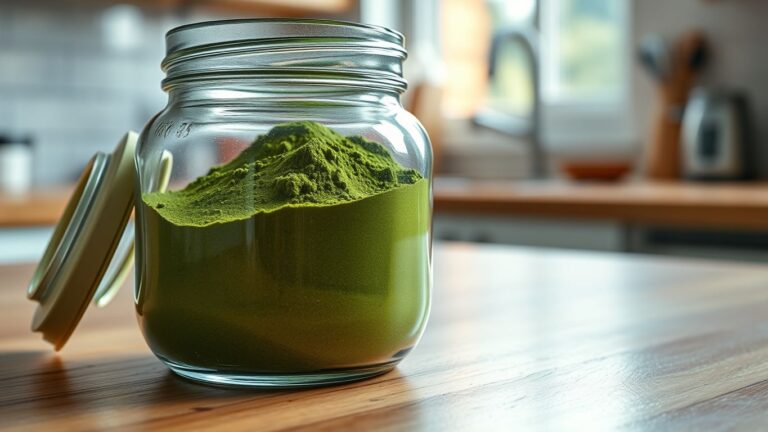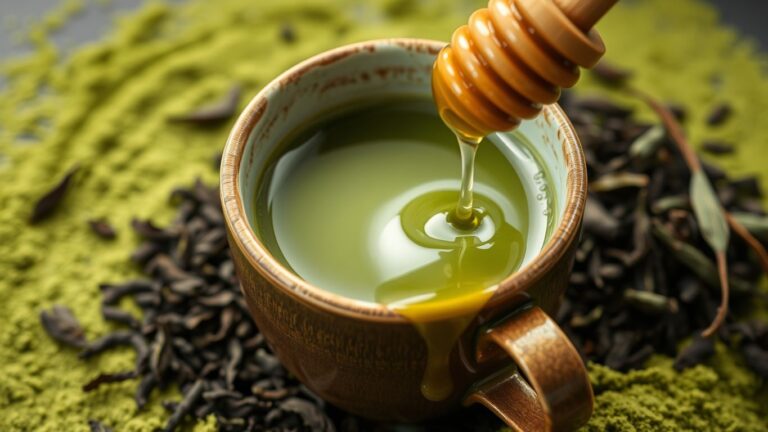As a new mom, you’re always looking for ways to stay energized while ensuring your baby’s well-being. Matcha, a type of powdered green tea, is popular for its health benefits and smooth energy boost. But is it safe to drink matcha while breastfeeding? Let’s dive into what you need to know.
Key Takeaways
- Matcha contains less caffeine than coffee, making it a potentially safer option for breastfeeding moms.
- Experts recommend limiting caffeine intake to 300 mg per day while breastfeeding, which is about three cups of coffee or four servings of matcha.
- Matcha is rich in antioxidants and other nutrients that can benefit both mom and baby.
- It’s important to choose high-quality, organic matcha to avoid contaminants like pesticides and heavy metals.
- Always monitor your baby for any signs of caffeine sensitivity and consult your doctor if you have concerns.
Understanding Matcha and Its Benefits
What is Matcha?
Matcha is a type of green tea that comes from Japan. Unlike regular green tea, where you steep the leaves and then discard them, matcha is made by grinding the entire tea leaf into a fine powder. This means you consume the whole leaf, getting more nutrients and benefits. Matcha has been used in traditional Japanese tea ceremonies for centuries.
Nutritional Profile of Matcha
Matcha is packed with nutrients. Here’s a quick look at what you get in a single serving:
| Nutrient | Amount per Serving |
|---|---|
| Antioxidants | High |
| Caffeine | Moderate |
| L-Theanine | High |
| Vitamins A, C | Present |
| Fiber | Present |
Health Benefits of Matcha
Drinking matcha can offer several health benefits:
- Rich in Antioxidants: Matcha is particularly high in antioxidants, which help neutralize free radicals in your body.
- Energy Boost Without the Crash: Unlike coffee, matcha provides a steady release of energy over a longer period.
- Supports Mental Clarity and Focus: The L-theanine in matcha promotes a state of calm alertness.
- Detoxification: The chlorophyll in matcha helps detoxify your body.
A cup of matcha tea a day might help keep your teeth in good shape. This could be because something in the leaves helps keep a healthy level of acid in your mouth.
In summary, matcha is not just a drink; it’s a powerhouse of nutrients and benefits that can support your overall well-being.
Caffeine Content in Matcha

Comparing Caffeine Levels: Matcha vs. Coffee
When it comes to caffeine, matcha falls somewhere between green tea and coffee. A typical serving of matcha contains around 20-45mg of caffeine per gram. This means a standard cup of matcha, which uses about 2-4 grams of powder, has roughly 40-90mg of caffeine. In comparison, a cup of brewed coffee contains about 95-165mg of caffeine. So, if you’re looking to reduce your caffeine intake, matcha might be a better option than coffee.
How Caffeine Affects Breastfeeding
Caffeine can pass into breast milk, which means your baby can be exposed to it. While moderate caffeine consumption is generally considered safe, too much can lead to irritability and sleep disturbances in infants. It’s important to monitor your baby’s reaction if you consume caffeinated beverages like matcha.
Recommended Caffeine Intake for Nursing Mothers
Health experts suggest that nursing mothers should limit their caffeine intake to about 200-300mg per day. Given that a cup of matcha contains around 40-90mg of caffeine, you can safely enjoy 2-3 cups a day. However, always keep an eye on your baby’s behavior and consult your healthcare provider if you have any concerns.
Safety of Drinking Matcha While Breastfeeding
General Guidelines for Caffeine Consumption
When you’re breastfeeding, it’s important to keep an eye on your caffeine intake. Doctors suggest that nursing mothers limit their caffeine to about 300 milligrams per day. This is roughly the amount found in two cups of coffee. Matcha tea is a safe caffeine source for breastfeeding mothers as long as you stay within this limit.
Potential Risks and Side Effects
While matcha is generally safe, consuming too much caffeine can lead to issues like jitteriness, irritability, and sleep problems for both you and your baby. It’s also important to choose high-quality matcha to avoid contaminants like lead, which can be present in lower-quality products.
Scientific Studies on Matcha and Breastfeeding
Research indicates that caffeine passes into breast milk in small amounts, but it usually doesn’t negatively affect the baby when consumed in moderation. Studies have shown that matcha, with its unique combination of caffeine and L-theanine, provides a more stable energy boost without the crash, making it a good option for new moms.
Benefits of Matcha for Breastfeeding Mothers

Energy Boost Without the Crash
As a new mom, you might be juggling diaper changes, playtime, and a breastfeeding schedule. Matcha can give you an energy boost without the crash that often comes with coffee. Matcha contains less caffeine than coffee, so you get a steady energy release that lasts longer.
Rich in Antioxidants
Matcha is packed with antioxidants, which help protect your body from harmful substances. These antioxidants can also support your immune system, making it easier to stay healthy while caring for your baby.
Supports Mental Clarity and Focus
Many new moms experience brain fog and fatigue. The chemical components in matcha can help improve your memory and focus. This can be especially helpful when you’re dealing with the emotional ups and downs of parenthood.
Matcha is a great and tasty way to further protect yourself and your little one against infection!
By incorporating matcha into your daily routine, you can enjoy these benefits while still keeping your caffeine intake in check.
Choosing the Right Matcha

When it comes to choosing the right matcha, there are several factors to consider to ensure you’re getting the best quality for your needs. Here’s what you need to know:
Organic vs. Non-Organic Matcha
Choosing between organic and non-organic matcha can be a bit confusing. Organic matcha is grown without synthetic pesticides or fertilizers, making it a cleaner option. Non-organic matcha, on the other hand, may be more affordable but could contain residues from chemicals used during farming. Opting for organic matcha ensures you’re consuming a purer product.
How to Identify High-Quality Matcha
High-quality matcha has a vibrant green color and a fine, smooth texture. It should have a sweet, creamy taste with a light, pleasant bitterness. Here are some tips to identify high-quality matcha:
- Color: Look for a bright, vibrant green hue.
- Texture: The powder should be fine and smooth, not coarse.
- Taste: High-quality matcha has a sweet, creamy taste with a hint of bitterness.
Trusted Brands for Nursing Mothers
When it comes to trusted brands, it’s essential to choose those that are known for their quality and safety. Some brands are highly recommended by experts and enthusiasts alike. For instance, our kitchen and dining writer asked chefs, tea professionals, and matcha obsessives about the best matcha powders out there — plus tried out some herself. Here are a few trusted brands:
- Matcha Konomi – Known for its high-quality, organic matcha.
- Encha – Offers organic matcha that is both pure and flavorful.
- Ippodo – A reputable brand with a long history of producing excellent matcha.
Investing in good quality matcha not only enhances your drinking experience but also ensures you reap the maximum health benefits.
By following these guidelines, you can enjoy the best matcha while ensuring it’s safe for you and your baby.
How to Incorporate Matcha into Your Diet
Simple Matcha Recipes
Incorporating matcha into your diet can be both fun and delicious. Here are a few simple recipes to get you started:
- Matcha Tea: Mix 1 teaspoon of matcha powder with 10 oz. of hot water. Whisk until frothy and enjoy.
- Matcha Latte: Combine 1 teaspoon of matcha powder with 10 oz. of boiling water, 1 tablespoon of organic cane sugar, 1 teaspoon of vanilla extract, and 1/4 cup of coconut milk. Whisk until smooth and serve hot or over ice.
- Matcha Smoothie: Blend 1 teaspoon of matcha powder with 1 banana, 1 cup of almond milk, and a handful of spinach for a nutritious start to your day.
Best Time to Drink Matcha
The best time to drink matcha is in the morning or early afternoon. This is when you can benefit most from its energy-boosting properties without affecting your sleep. Avoid drinking matcha late in the day to prevent any potential sleep disturbances.
Creative Ways to Enjoy Matcha
Matcha is incredibly versatile and can be added to a variety of dishes:
- Baked Goods: Add matcha powder to your favorite muffin or cookie recipes for a unique twist.
- Oatmeal: Stir a teaspoon of matcha into your morning oatmeal for an extra boost of antioxidants.
- Yogurt: Mix matcha powder into plain yogurt and top with fresh fruit for a healthy snack.
Experiment with different recipes and find what works best for you. Matcha is packed full of health benefits and is a great addition to any diet.
By incorporating matcha into your daily routine, you can enjoy its numerous health benefits while keeping your diet exciting and flavorful.
Monitoring Your Baby’s Reaction

Signs of Caffeine Sensitivity in Infants
When you drink matcha while breastfeeding, it’s important to watch for signs of caffeine sensitivity in your baby. Babies who are sensitive to caffeine may show symptoms like fussiness, jitteriness, and poor sleep patterns. If you notice these signs, it might be a good idea to cut back on your matcha intake.
When to Consult a Pediatrician
If your baby continues to show signs of caffeine sensitivity, it’s best to consult a pediatrician. They can provide personalized advice and help you determine if your matcha consumption is affecting your baby. Don’t hesitate to seek professional guidance if you’re concerned.
Keeping a Food Diary
Keeping a food diary can be a helpful way to track your baby’s reactions to your diet. Write down what you eat and drink, and note any changes in your baby’s behavior. This can help you identify patterns and make informed decisions about your matcha consumption.
Monitoring your baby’s reaction to your diet is crucial for their well-being. Stay observant and proactive to ensure they remain happy and healthy.
Alternative Energy-Boosting Options
As a breastfeeding mother, you might be looking for ways to keep your energy levels up without relying on coffee. Here are some great alternatives to consider:
Herbal Teas Safe for Breastfeeding
Herbal teas can be a soothing and safe option for nursing mothers. Some popular choices include:
- Chamomile Tea: Known for its calming effects, it can help you relax and improve sleep quality.
- Rooibos Tea: Caffeine-free and rich in antioxidants, it’s a great choice for overall health.
- Peppermint Tea: Refreshing and can help with digestion, but use in moderation as it may reduce milk supply.
Nutrient-Rich Snacks
Eating the right snacks can give you a quick energy boost. Here are some nutrient-rich options:
- Oats: A great source of carbohydrates and fiber, they can help keep you full and energized.
- Nuts and Seeds: Packed with protein and healthy fats, they are perfect for a quick snack.
- Fruits: Fresh fruits like bananas and apples provide natural sugars and essential vitamins.
Lifestyle Tips for Sustained Energy
Maintaining your energy levels isn’t just about what you eat or drink. Here are some lifestyle tips to help you stay energized:
- Get Enough Sleep: Try to nap when your baby naps to catch up on rest.
- Stay Hydrated: Drink plenty of water throughout the day to keep your body functioning well.
- Exercise Regularly: Even a short walk can boost your energy and improve your mood.
Remember, moderation is key! Avoid drinking more than two or three cups of matcha per day.
By incorporating these alternatives into your routine, you can enjoy sustained energy without the need for coffee.
Expert Opinions and Recommendations
What Healthcare Professionals Say
Healthcare professionals generally agree that moderation is key when it comes to consuming matcha while breastfeeding. According to lactation consultants, it’s safe to drink matcha tea daily—as long as you drink it in moderation. They emphasize that the caffeine content in matcha is lower than in coffee, making it a better option for nursing mothers.
Real-Life Experiences from Nursing Mothers
Many nursing mothers have shared their positive experiences with drinking matcha. They report feeling more energized and focused without the jittery side effects often associated with coffee. Some mothers also appreciate the rich antioxidants in matcha, which they believe contribute to their overall well-being.
Questions to Ask Your Doctor
When considering adding matcha to your diet, it’s essential to consult your healthcare provider. Here are some questions you might want to ask:
- Is it safe for me to drink matcha while breastfeeding?
- How much matcha can I safely consume each day?
- Are there any potential side effects I should be aware of?
- Can matcha interact with any medications I’m currently taking?
Always consult your healthcare provider before making any significant changes to your diet, especially when breastfeeding. Your doctor can provide personalized advice based on your unique health needs.
Conclusion
In summary, drinking matcha while breastfeeding can be a safe and enjoyable way to get a gentle energy boost, as long as you keep an eye on your caffeine intake. Matcha offers a cleaner source of caffeine compared to coffee and comes with added health benefits like antioxidants and stress relief. However, moderation is key. Always consult your healthcare provider before making any changes to your diet, especially when breastfeeding. By choosing high-quality matcha and sticking to recommended limits, you can enjoy this vibrant green tea without worry. So go ahead, savor your matcha, and enjoy the benefits it brings to both you and your baby.
Frequently Asked Questions
Is it safe to drink matcha while breastfeeding?
Yes, you can drink matcha while breastfeeding. However, it’s important to keep an eye on your caffeine intake since caffeine can pass into breast milk. Experts recommend limiting your caffeine to about 300 mg per day.
How much matcha can I drink daily while breastfeeding?
You can safely drink 1-2 cups of matcha per day while breastfeeding. Each cup of matcha typically has around 70 mg of caffeine, so make sure your total caffeine intake stays within the recommended limit of 300 mg per day.
What are the benefits of matcha for breastfeeding mothers?
Matcha is rich in antioxidants and provides a steady energy boost without the crash that comes with coffee. It also supports mental clarity and focus, which can be very helpful for new mothers.
Can matcha affect my baby’s sleep?
Caffeine from matcha can pass into breast milk and may affect your baby’s sleep. If you notice your baby is more fussy or has trouble sleeping, consider reducing your caffeine intake.
Is organic matcha better for breastfeeding mothers?
Yes, organic matcha is generally better because it’s free from pesticides and other harmful chemicals. Always choose high-quality matcha from trusted brands to ensure you’re getting the best product.
What are the signs of caffeine sensitivity in infants?
Signs of caffeine sensitivity in infants include fussiness, irritability, and trouble sleeping. If you notice these symptoms, it might be a good idea to cut back on your caffeine intake and consult a pediatrician.
Can I use matcha in foods and drinks other than tea?
Absolutely! Matcha is very versatile and can be added to smoothies, lattes, and even baked goods. Just remember that the caffeine content still counts toward your daily limit.
When should I consult a pediatrician about my caffeine intake?
If you notice any signs of caffeine sensitivity in your baby or have concerns about how much caffeine you’re consuming, it’s a good idea to consult your pediatrician for personalized advice.






